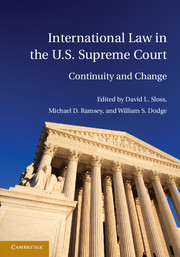Book contents
- Frontmatter
- Contents
- List of Contributors
- Table of Cases
- Acknowledgments
- Introduction
- PART I FROM THE FOUNDING TO THE CIVIL WAR
- PART II FROM THE CIVIL WAR TO THE TURN OF THE CENTURY
- PART III FROM THE TURN OF THE CENTURY TO WORLD WAR II
- PART IV FROM WORLD WAR II TO THE NEW MILLENNIUM
- 10 Treaties in the Supreme Court, 1946–2000
- 11 Customary International Law in the Supreme Court, 1946–2000
- 12 International Law as an Interpretive Tool in the Supreme Court, 1946–2000
- 13 Global Power in an Age of Rights: Historical Commentary, 1946–2000
- PART V INTERNATIONAL LAW IN THE U.S. SUPREME COURT IN THE TWENTY-FIRST CENTURY
- V.A TREATIES AFTER 2000
- V.B CUSTOMARY INTERNATIONAL LAW AFTER 2000
- V.C INTERNATIONAL LAW AND CONSTITUTIONAL INTERPRETATION AFTER 2000
- V.D INTERNATIONAL LAW AND STATUTORY INTERPRETATION AFTER 2000
- V.E INTERNATIONAL LAW AND THE WAR ON TERROR
- VI CONCLUSION
- Index
- References
10 - Treaties in the Supreme Court, 1946–2000
Published online by Cambridge University Press: 05 July 2011
- Frontmatter
- Contents
- List of Contributors
- Table of Cases
- Acknowledgments
- Introduction
- PART I FROM THE FOUNDING TO THE CIVIL WAR
- PART II FROM THE CIVIL WAR TO THE TURN OF THE CENTURY
- PART III FROM THE TURN OF THE CENTURY TO WORLD WAR II
- PART IV FROM WORLD WAR II TO THE NEW MILLENNIUM
- 10 Treaties in the Supreme Court, 1946–2000
- 11 Customary International Law in the Supreme Court, 1946–2000
- 12 International Law as an Interpretive Tool in the Supreme Court, 1946–2000
- 13 Global Power in an Age of Rights: Historical Commentary, 1946–2000
- PART V INTERNATIONAL LAW IN THE U.S. SUPREME COURT IN THE TWENTY-FIRST CENTURY
- V.A TREATIES AFTER 2000
- V.B CUSTOMARY INTERNATIONAL LAW AFTER 2000
- V.C INTERNATIONAL LAW AND CONSTITUTIONAL INTERPRETATION AFTER 2000
- V.D INTERNATIONAL LAW AND STATUTORY INTERPRETATION AFTER 2000
- V.E INTERNATIONAL LAW AND THE WAR ON TERROR
- VI CONCLUSION
- Index
- References
Summary
Postwar America, most would agree, was a very different country from the one that went to war four years earlier. Consider first the demographic changes. Vast numbers of men had left their homes to move around the country, if not around the world. Almost as many women had taken on new roles in the wartime economy, moving sociologically if not necessarily geographically. At least as important was the transformation of the economy. A fragile recovery from a profound depression became an extraordinarily robust economic expansion. State management of that economy was extensive and, thanks to the happy outcome of the war, widely accepted as desirable.
Then there was the intangible impact of the war. A great sense of triumph, untempered by the widespread devastation and economic collapse that afflicted the other victorious allies (not to mention the vanquished), suffused the culture. Higher education opened up to the returning GIs on a scale never before known in American history, enabling access for many to a meritocratic, rationalized (in the bureaucratic sense) middle and upper-middle class. The conditions faced by returning African American soldiers were little different from those they had left, but their experience in the war made them less willing to accept the indignities of Jim Crow. And a distant and exotic outside world had become a direct and pervasive presence, both in the parts of the globe that the victorious nation administered, reconstructed, and guarded and in the other, darker parts that posed a new, seemingly existential threat.
- Type
- Chapter
- Information
- International Law in the U.S. Supreme Court , pp. 317 - 352Publisher: Cambridge University PressPrint publication year: 2011
References
- 2
- Cited by



